Steven Mnuchin’s good fortune is that, if confirmed by the Senate, he’ll become the nation’s 77th Treasury secretary at a moment when the U.S. economy is in improving health, a clear contrast to the frightening situation Timothy Geithner confronted when he took office eight years ago.
Explaining what the president actually meant likely will be one of Mr. Mnuchin’s toughest jobs.
Still, there are more than a few challenges awaiting the wealthy financier in his first job in the public sector:
Donald Trump
Financial markets, business executives and foreign economic policymakers are reading Donald J. Trump’s tweets and listening to his running commentary—and desperately trying to differentiate bluster from policy. The president-elect’s tweets already move markets, and while Washington is learning to cope with Mr. Trump’s occasional inconsistencies, finance ministers from around the world are probably baffled. As tempting as it may seem to pose questions directly to the president on Twitter, the more likely route for them to get some clarity will be to call Mr. Mnuchin. Explaining what the president actually meant likely will be one of Mr. Mnuchin’s toughest jobs. And he’ll also need to have the spine to say “no” to the president when necessary—whether to shield the IRS from meddling or to talk the president out of a truly unwise economic policy that Trump’s political advisers favor.
Defining the job
Traditionally, the Treasury secretary is the lead spokesman on domestic and international economic policy and, if not the most influential, then among the two or three most influential voices on economic policy inside the administration. But there’s not much traditional about the Trump administration, and there are an unusual number of competing centers of power on economics: Wilbur Ross (a Brookings Institution trustee) at Commerce, Peter Navarro inside the White House on international economics, Gary Cohn at the National Economic Council, adviser Anthony Scaramucci and Stephen Miller as a senior policy adviser for starters. This isn’t unique: the tensions between Mr. Geithner and Larry Summers at the Obama National Economic Council are well-documented. But the potential for chaos and cacophony in this administration far exceeds anything in recent history: Not only are there more players, but several of them appear closer to the president than the Treasury secretary and are more experienced in commanding public attention. The Treasury post comes with formidable assets—unique expertise and number-crunching capacity on taxes, a capable career staff, and a seat at the table at the International Monetary Fund, World Bank and gatherings of the world’s economic policymakers. But in any administration, a lot of the Treasury’s clout depends on the secretary’s ability to leverage those assets in internal administration deliberations, in dealings with Congress and in establishing himself as credible in public.
The dollar
The Treasury secretary is (traditionally) the chief spokesman for the U.S. government on the foreign-exchange value of the U.S. dollar. The U.S. doesn’t routinely intervene in foreign exchange markets as it did in the late 1980s and early 1990s, but markets still take their cues from the Treasury secretary’s words. And here’s Mr. Mnuchin’s challenge:
- Trump vows to shrink the U.S. trade deficit.
- The fiscal policies the president-elect supports have contributed to a stronger U.S. dollar. The WSJ Dollar Index is up about five percent since Election Day.
- The stronger dollar will tend to increase rather than reduce the trade deficit by making U.S. exports pricier and U.S. imports cheaper. That’s going to be hard to explain away—especially to the export-reliant industries Mr. Trump pledged to help save during his campaign. The dollar, of course, is just one way in which trade policy intersects with markets and the economy.
With Mr. Ross at Commerce, veteran anti-free trader Robert Lighthizer as U.S. Trade Representative and Mr. Navarro at the new White House National Trade Council (see point #1 above), Mr. Mnuchin won’t be making trade policy; he may have a bigger role if Trump tariffs recede from view and are replaced by a tax bill that includes the border-adjustable cash-flow tax that House Republicans are contemplating. Mr. Mnuchin also may have to cope with changing sentiment in financial markets—so happy now as the incoming administration contemplates tax cuts, a rollback of regulations, rising business and consumer confidence and faster economic growth. There’s a chance today’s ebullience will dissipate if markets begin to fret about a trade war or something unforeseen. When markets gyrate, the world looks to the U.S. Treasury secretary (and the Federal Reserve chair) for reassurance that there are at least a few adults in charge.
The debt
The federal debt wasn’t an issue in the recent presidential campaign. With the Treasury managing to borrow billions of dollars a day at very low interest rates, it’s not a crisis today. But measured against the size of the economy, the federal debt (about 75 percent of GDP) is more than double what it was before the Great Recession (35 percent). Even before taking account of any tax cuts Mr. Trump may sign into law, it’s going to keep rising to levels never before seen in U.S. history (110 percent of GDP by 2036 if current policies persist, the Congressional Budget Office projects). The problem, in short, is this: The U.S. government has promised to pay benefits that exceed the revenues that today’s tax code will produce, largely because a growing fraction of Americans will be old enough to get federal retirement and health benefits—benefits, by the way, that Mr. Trump has said he won’t cut. Ever since Alexander Hamilton, the secretary of the Treasury has been the guardian of the federal fisc. Soon we’ll learn if Mr. Mnuchin is willing and able to restrain Congress and the president from digging the nation deeper in debt. Later, we’ll see if he is interested in and able to shape policies that increase the pace of economic growth and (because growth alone won’t solve the problem) prevent ever-wider federal budget deficits by either cutting spending or raising taxes—or whether he will bequeath this big problem to the 78th secretary of the Treasury as his predecessors did to him.
The Brookings Institution is committed to quality, independence, and impact.
We are supported by a diverse array of funders. In line with our values and policies, each Brookings publication represents the sole views of its author(s).

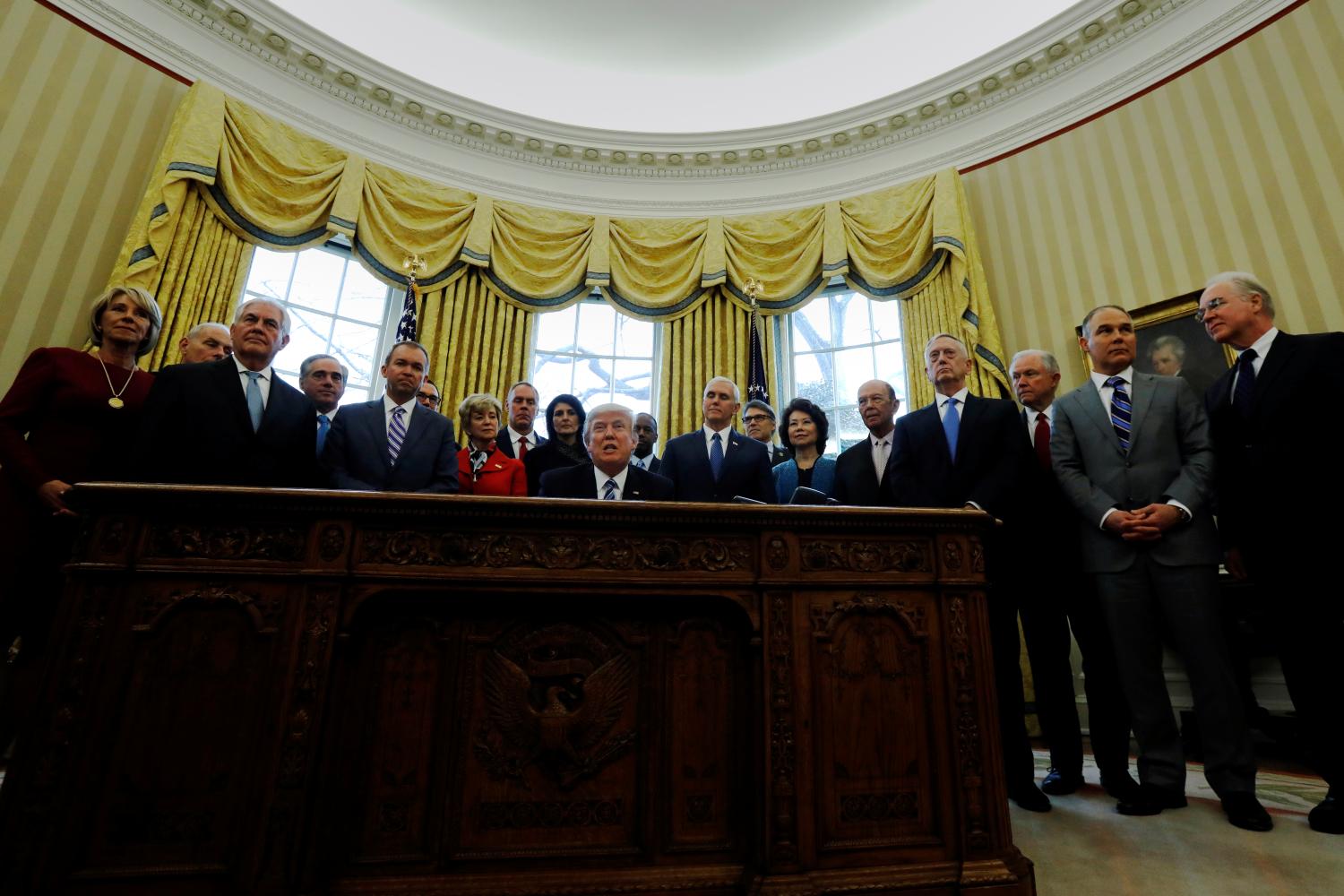
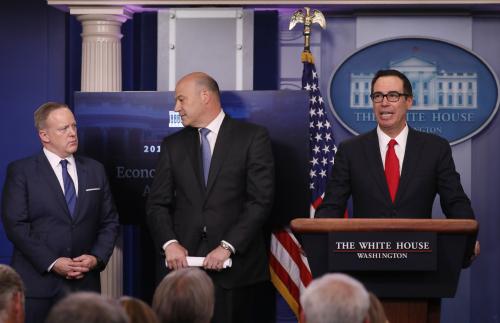

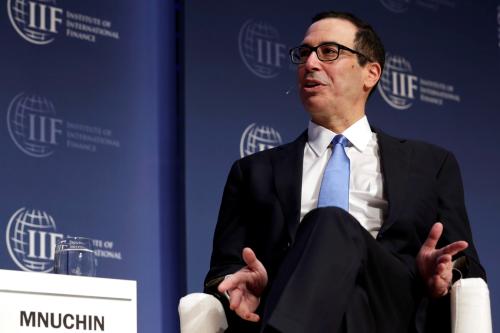
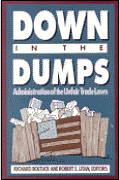
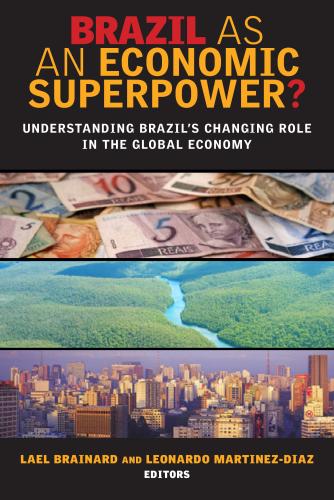



Commentary
Confirming Team Trump: Steve Mnuchin and the four D’s
January 18, 2017